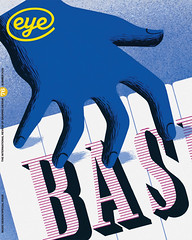Summer 2010
Dot dot rock
Zoë Street Howe on the black art of ‘metal umlauts’

‘Metal umlauts’ echo the ‘devil horn’ rock salute, carry a menacing whiff of Gothic mystery – and make us look twice. Yes, heavy rockers love a good diacritical mark, and it appears that the gratuitous umlaut, often presented in conjunction with dense blackletter script, has been good, in turn, to them. There is even a metal band called Umlaut. (Yet their name bears no dots. See what they did there?)
As the proud owner of an umlaut (well, strictly speaking, a diaeresis), I would insist to teachers that if they did not include my ‘two dots’, it was not my name. I was Zoë Street. I did not know who this boring Zoe Street was. Umlauts, to English-speakers, are oddities in a beige world of unadorned letters, and, when you are a little girl, you can replace them with flowers, hearts, stars … This probably is not what Motörhead, Queensrÿche or Blue Öyster Cult had in mind, but who knows what umlaut fun they had while doodling on the tour bus?
It is Blue Öyster Cult’s fault – they started it – thus inspiring a raft of dot-loving metal bands including even Spinal Tap who parodied the trend by having their umlaut on the ‘n’.
When the producer Sandy Pearlman and rock writer Richard Meltzer were strolling in New York, thinking of band names, Pearlman spotted a restaurant selling Blue Point oysters.
‘I said, “Why don’t we call it Blue Oyster Cult?” And Richard said, “And add an umlaut over the ‘o’!”’
The umlaut was ‘meant to bring ambiguous implications to the name’. It certainly brought ambiguity to the pronunciation. Both Mötley Crüe and Motörhead scratched their hair-sprayed heads when German audiences bellowed ‘Murtley Crewer!’ and ‘Mottuurhead!’ at them. ‘We hadn’t thought about its proper usage,’ admitted Crüe bassist Nicky Sixx. (The Crüe’s umlauts were in reference to their favourite beer, Löwenbräu.)
Gratuitous umlauts force us to pay attention to an unexpected visual element. However, the very countries that inspired such Teutonic lettering seem to think the whole thing is, well, a bit läughable. ‘Metal umlauts look very silly to Finnish-speakers,’ explains a writer on the TV Tropes website, ‘because we know how to pronounce umlauted letters. I’d imagine the same is true for speakers of German … Umlauts are seen as weaker versions of their parent vowel.’ Weak? Don’t tell Motörhead’s Lemmy …
First published in Eye no. 76 vol. 19.

